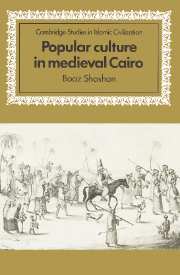Book contents
- Frontmatter
- Contents
- Preface
- List of abbreviations
- List of short references to frequently cited works
- Note on transcription and dates
- Introduction
- 1 Sufism and the people
- 2 Al-Bakrī's biography of Muḥammad
- 3 The festival of Nawrūz: a world turned upside down
- 4 The politics and “moral economy” of the Cairene crowd
- 5 Popular culture and high culture in medieval Cairo
- Appendix: Sufi shaykhs in Mamluk Cairo
- Notes
- Select bibliography
- Index
5 - Popular culture and high culture in medieval Cairo
Published online by Cambridge University Press: 24 September 2009
- Frontmatter
- Contents
- Preface
- List of abbreviations
- List of short references to frequently cited works
- Note on transcription and dates
- Introduction
- 1 Sufism and the people
- 2 Al-Bakrī's biography of Muḥammad
- 3 The festival of Nawrūz: a world turned upside down
- 4 The politics and “moral economy” of the Cairene crowd
- 5 Popular culture and high culture in medieval Cairo
- Appendix: Sufi shaykhs in Mamluk Cairo
- Notes
- Select bibliography
- Index
Summary
This book has been about the culture of ordinary people in medieval Cairo. One should bear in mind, however, that in the Egyptian city, as in many other places, popular culture was only one cultural block (“subculture” is another term) in a complex system. In the case of Egypt there also existed the cultures of the rulers, of the scholars, of the wealthy merchants and bureaucrats. All these and popular culture did not function in isolation from one another. They were bound to exert an “osmotic” influence on each other and to interact in a variety of ways. It is the interaction in medieval Cairo between popular culture and all the rest – to which, for the sake of brevity, I shall refer as high culture – that this concluding chapter seeks to explore.
From an “ideological” point of view, such interaction would seem questionable, at least at first sight. The information we have, which is about the attitude of the learned toward the culturally “inferior”, reveals criticism, perhaps outright rejection, of popular culture – not the concept itself, but its expressions. First and foremost of these were religious beliefs and practices, which in their popular garb were the main target of scholarly disapproval. This disapproval reached an extreme point in the writings of Ibn Taymiyya (1263–1328). This prominent theologian spent almost his entire life in Syria and was rarely in Cairo, sometimes as a prisoner for his theological beliefs.
- Type
- Chapter
- Information
- Popular Culture in Medieval Cairo , pp. 67 - 78Publisher: Cambridge University PressPrint publication year: 1993



